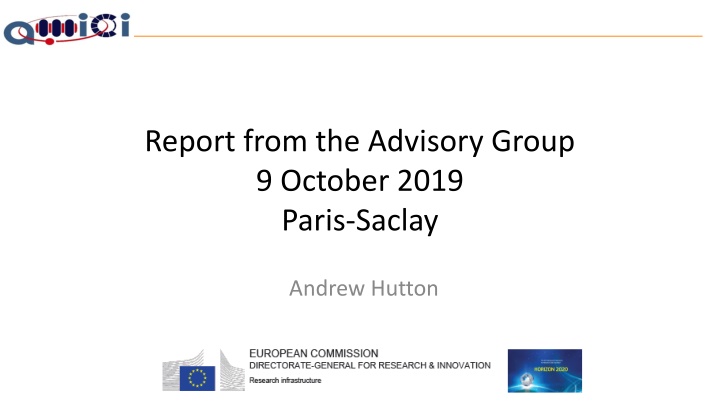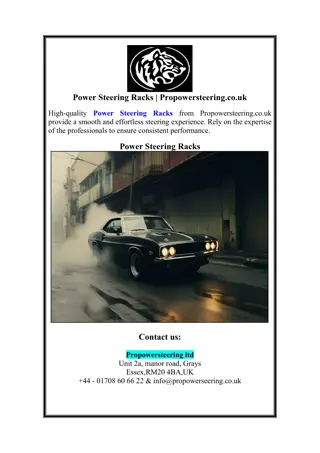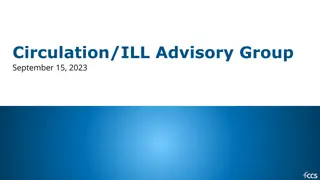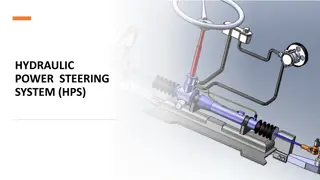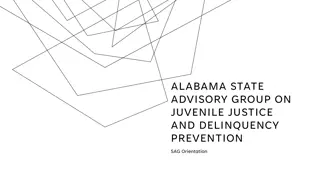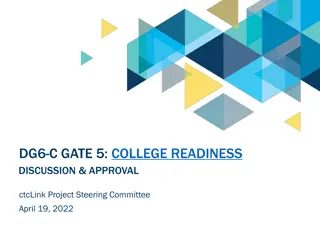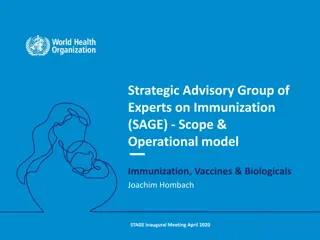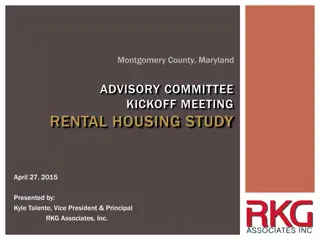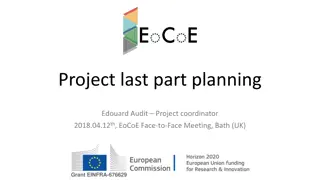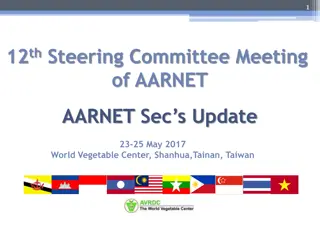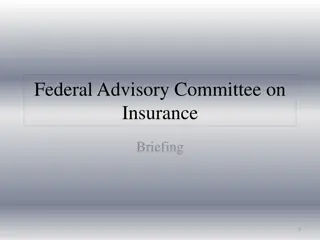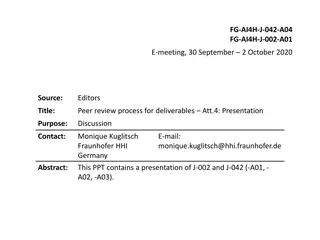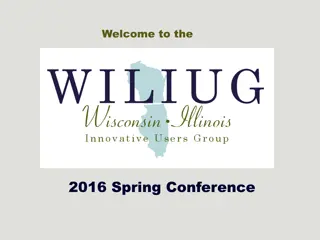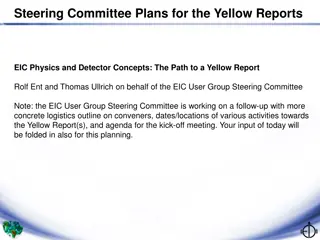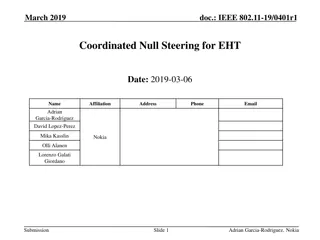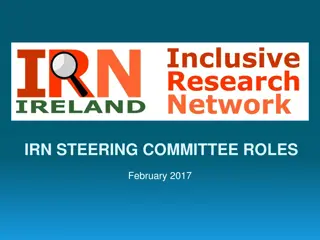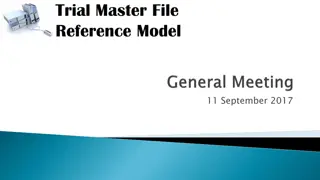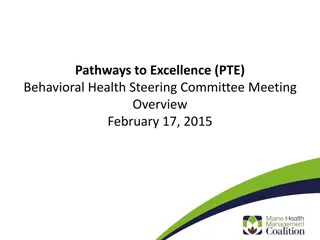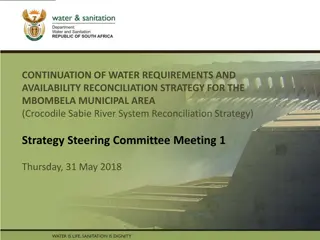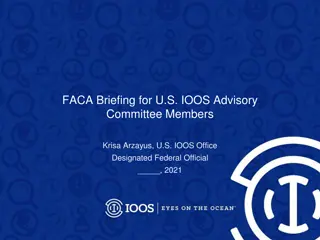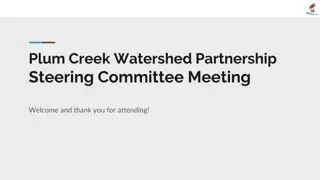Role of Advisory Group in AMICI Steering Committee Deliverables
The Advisory Group plays a crucial role in supporting the AMICI Steering Committee to deliver on their commitments, especially those involving strong industrial participation. Appointed and guided by the Steering Committee, the Advisory Group provides strategic advice, recommendations, and assistance, reporting to the General Assembly. Members of the group, drawn from various companies, contribute their expertise at industry forums and annual meetings. The group has convened multiple times, including at kick-off and annual meetings in different locations.
Download Presentation

Please find below an Image/Link to download the presentation.
The content on the website is provided AS IS for your information and personal use only. It may not be sold, licensed, or shared on other websites without obtaining consent from the author.If you encounter any issues during the download, it is possible that the publisher has removed the file from their server.
You are allowed to download the files provided on this website for personal or commercial use, subject to the condition that they are used lawfully. All files are the property of their respective owners.
The content on the website is provided AS IS for your information and personal use only. It may not be sold, licensed, or shared on other websites without obtaining consent from the author.
E N D
Presentation Transcript
Report from the Advisory Group 9 October 2019 Paris-Saclay Andrew Hutton
Role of the Advisory Group The role of the Advisory Group is to assist the AMICI Steering Committee, including the coordinator and the work package leaders, to produce their promised deliverables, and particularly those involving a strong industrial participation 9-10/10/2019, Paris-Saclay 3rd Annual Meeting 2
Organization of the Advisory Group An Advisory Group will be appointed and steered by the Steering Committee The Advisory Group shall give advice and recommendations on strategic matters to the Steering Committee and report them to the General Assembly The chair of the Advisory Group will be designated by the Steering Committee and shall be allowed to participate in General Assembly meetings upon invitation but has not any voting rights 9-10/10/2019, Paris-Saclay 3rd Annual Meeting 3
Group Members Members who presented at the AMICI 2nd Industry Forum Name First name Company *** Talk by Serge Sierra, Thales BETHUYS St phane Thales GRESELE Ambra Zanon DZIWOKI Adam Prevac GEHRING Michael Babcock Noell GmbH *** *** Talk by Imran Tahir HOWLAND Patricia e2v HUTTON Andrew Jefferson Laboratory *** *** LANCELOT Jean-Luc SigmaPhi LINDHOLM Mikael Scandinova MCGINNIS David ESS MELHEM Ziad Oxford Instruments PEINIGER Michael Research Instruments GmbH PELLECCHIA Antonio AS-G TROXLER Josef Ampegon *** *** YAMAMOTO Akira KEK 9-10/10/2019, Paris-Saclay 3rd Annual Meeting 4
Name First name Company BETHUYS St phane Thales GRESELE Ambra Zanon DZIWOKI Adam Prevac GEHRING Michael Babcock Noell GmbH HOWLAND Patricia e2v HUTTON Andrew Jefferson Laboratory LANCELOT Jean-Luc SigmaPhi LINDHOLM Mikael Scandinova MCGINNIS David ESS MELHEM Ziad Oxford Instruments PEINIGER Michael Research Instruments GmbH PELLECCHIA Antonio AS-G TROXLER Josef Ampegon YAMAMOTO Akira KEK 9-10/10/2019, Paris-Saclay 3rd Annual Meeting 5
Meetings The Advisory Group has met four times during the Kick-off and Annual meetings Kick-off Meeting 18/1/2017, FIAP Jean Monnet, Paris 1st Annual Meeting 21/2/2018 Uppsala 2nd Annual Meeting 22-24/2/2019 Salerno 3rd Annual Meeting 22-24th January 2019, Paris Saclay In addition, members of the Advisory Group attended, and participated in, the industrial meetings Industry Days, 18 19/4/2017, Padova 2nd Industry Forum, 17 18/9/2019, Brussels 9-10/10/2019, Paris-Saclay 3rd Annual Meeting 6
WP1: Management Overall management of the project in order to ensure the achievement of the project objectives and the coordination of the work done in the different Work Packages Relations with European Commission including progress and financial reporting Exchange of information between the partners and with industry External dissemination of the project results Communication and outreach activities. Defining how industry, from large enterprises to SMEs, will be associated to the project and their role in the different Work Packages 9-10/10/2019, Paris-Saclay 3rd Annual Meeting 7
WP1: Relations with Industry Can we, and should we, extend the Spanish Ineustar model to European Science Industry? Ineustar is a successful model in Spain that represents Spanish Industries to help make contacts with Research Institutes and other business opportunities The Advisory Group was unanimous that the members did not want an over-arching organization Most members are well established and already have contacts It was felt that the members would be better served by direct interaction with the AMICI project 9-10/10/2019, Paris-Saclay 3rd Annual Meeting 8
WP1: Industry Interaction with AMICI Should Industry partners interact with AMICI as an Association of private companies foreseen via an associated industry partnership? An informal group of associated industry partners elects a representative (1 person) for the AMICI Collaboration Board To receive information about developments with Technical Facilities To influence future developments of Technical Facilities The Advisory Group recommends that each company participates directly in AMICI, not as part of a consortium 9-10/10/2019, Paris-Saclay 3rd Annual Meeting 9
WP2: Strategy Key Elements Identification of the Key Accelerators Technological Areas which are essential for the sustainability and long term development of the Technological Infrastructures Background strategic aspects: the existing scientific roadmap of Research Infrastructures in Europe (ESFRI) and worldwide, and their specific agendas; the approaches to Innovation in the EC and in the other regions Study how to support and develop the Technological Infrastructures in future 9-10/10/2019, Paris-Saclay 3rd Annual Meeting 10
WP2: Key Technology Areas The Advisory Group was asked to comment on the list of key technology areas 1. Particle sources 2. High precision magnets 3. High field SC magnets 4. Normal Conducting RF cavities 5. SRF structures 6. Radio Frequency power sources 7. Cryogenics 8. Beam instrumentation The eight areas were accepted, but cryostats should be added to the SRF category and modulators should be added to RF power sources 9-10/10/2019, Paris-Saclay 3rd Annual Meeting 11
WP2: System Integration System integration is not part of the WP2 charge and the Advisory Board would like it to be included The Advisory Group recommends developing a statement as to how systems can be included in AMICI goals similar to the list of Key Technologies Areas The Advisory Group would like a recommendation as to when an industry is asked to build-to-print, when to build to performance and when industry should participate in design Industry is very keen to be involved from the design phase though production Industry is concerned about protecting IP created during prototyping and how that applies to series production 9-10/10/2019, Paris-Saclay 3rd Annual Meeting 12
WP3: Cooperation Define the conditions of the coordination of Technological Infrastructures in the area of accelerators and superconducting magnets in order to harmonize their operation and increase their efficiency . . .and establish a co-innovation platform with industry Eligibility criteria for the participation and networking of Technological Infrastructures will be investigated in detail, in order to finally propose an appropriate coordination model This targeted network can support temporary exchange of highly qualified personnel; as innovative expert teams should have access to dedicated Technical Infrastructures for education and training purposes The elaboration of a consortium agreement reflecting the goals of the overall Cooperation programme will be sought. 9-10/10/2019, Paris-Saclay 3rd Annual Meeting 13
WP3: Proposed Eligibility Criteria Capacity and willingness of the new Member to integrate itself in an organization of Technological Facilities that coordinate their efforts and their development towards the construction of future research infrastructures, and that are willing to provide access to their technical platforms to other partners and to industries Capability of the new Member to reinforce the technical spread and the expertise of the existing Technology Infrastructure and hence contribute to more efficient sharing of efforts at the European level The Advisory Board did not have time to evaluate the criteria 9-10/10/2019, Paris-Saclay 3rd Annual Meeting 14
WP3: Goals of the Collaboration Found a joint European Technology Infrastructure dedicated to the development, testing and production of accelerator components and superconducting (SC) magnets Sustain the infrastructure considered part of the AMICI Collaboration Define the contents of the infrastructure of the AMICI partners and the necessary alignment for a common (across all Parties) Infrastructure Setup project and working groups of common interest Seek financing for the implementation of the roadmap Ensure availability of the AMICI infrastructure within the AMICI Collaboration and its access by external partners Ensure the availability of highly trained personnel to operate the AMICI Technological Facilities Ensure long term support, maintenance and development of the AMICI Infrastructures 9-10/10/2019, Paris-Saclay 3rd Annual Meeting 15
WP3: Goals of the Collaboration Promote the availability of the AMICI Infrastructure to external partners in particular to industrial partners Setup a common compensation scheme for industrial use of AMICI Infrastructure Propose training for external users, in particular industry, in the know- how, techniques and quality standards of the Technical Facilities Setup, maintain and provide access to a database allowing preservation and dissemination of common knowledge and know-how within the members and to the benefit of external users The Industrial members would like to understand the advantages of being a member of AMICI compared to not being a member Exchange of staff for training is interesting, but only if series production is expected near term (<3 years) 9-10/10/2019, Paris-Saclay 3rd Annual Meeting 16
WP3: Network and Collaboration Model The networking and collaboration model proposed by WG3 was evaluated by the Advisory Board The Advisory Group accepted this vision but wanted more detail e.g. who is in the Coordination Team The present version of the AMICI Collaboration is consistent with the proposal The Board would still like to see a definition of the Coordination Team 9-10/10/2019, Paris-Saclay 3rd Annual Meeting 17
9-10/10/2019, Paris-Saclay 3rd Annual Meeting 18
WP4: Innovation Promote the potential applications of mature Accelerator and Magnet technologies to European businesses, with a particular focus on innovative SMEs, which have the potential to apply their expertise to applications for societal needs Identify a European network of commercial organizations, consisting of both large companies and SMEs, that has the potential to innovate in the field of mature Accelerator and Magnet technologies Identify domains of societal applications and potential markets beyond Research Infrastructures that can be developed by these innovative commercial organizations Identify ways to optimize effective engagement between Industry and the Technological Infrastructures to support the development of societal applications by industry 9-10/10/2019, Paris-Saclay 3rd Annual Meeting 19
Comments on Innovation Technical demands are often at the limits of physics Requires prototyping and limitation of risks (avoid penalties) Requires close cooperation between research labs and SME industries Technology Transfer between Research Labs and Industries This is key for SME companies synergies to other industrial projects Beneficial for both: Research Labs and Industries (IP; licensing) Flexibility for superior technical solutions SME companies are capable to offer innovative solutions Take benefit from Industrial know-how Take benefit from standardization and synergies between Contracts Continuous overall cost improvements (competition works well) Courtesy of Josef Troxler (OCEM) 9-10/10/2019, Paris-Saclay 3rd Annual Meeting 20
WP5: Industrialization Sensitize and train the industrial companies in the needs, the know- hows, the techniques, the methods and the quality standards of laboratories developing accelerator and superconducting magnet technologies in their Technological Infrastructures Industrialization of technologies involved in accelerator related activities will foster innovation and place European Industries in a position to take a major part in the construction of new Research Infrastructures in Europe and worldwide Activities aiming to understand how to standardize basic knowledges and general safety procedures will be performed 9-10/10/2019, Paris-Saclay 3rd Annual Meeting 21
WP5: Industrialization Members of the Advisory Board were concerned that they were not involved in the industrialization process early enough If industry is to gain the know-how, they must be involved in design and prototyping, not just build-to-print Here are the preferred model and commercial issues: 9-10/10/2019, Paris-Saclay 3rd Annual Meeting 22
Cooperation Model Industries - Research Labs Early involvement of industry during design phase Conceptual work Layout and space requirements, time scale Preparation of preliminary technical specifications Design (R&D) Contracts for complex parts Tender procedures for Prototype Reducing technical risks for supplier as well as for the laboratory Prototype testing during preparation of tendering process Qualification for next tendering step Tender process for Series production Specifications based on experience with prototype Accelerated process for fast production release Built-to print requests are not the preferred solution 9-10/10/2019, Paris-Saclay 3rd Annual Meeting 23 Courtesy of Josef Troxler (OCEM)
Commercial Issues Contractual Conditions in tenders with Research Labs It should be considered that specialized Industries are SME companies Positive cash flow is always of high importance: Advance payments Progress payments against milestones Performance and Warranty Bonds are often linked to cash flow Liabilities can not be unlimited, indirect liabilities to be excluded Warranty conditions should be reasonable Component constraints Fast evolution of Controls (software) Service and Support Agreements Business continuity, permanent improvements and maintenance Optimized operational performance 9-10/10/2019, Paris-Saclay 3rd Annual Meeting 24 Courtesy of Josef Troxler (OCEM)
Conclusions There should be time left in the schedule between the Advisory Board meetings and the presentation of the conclusions to the Steering Committee to enable the recommendations to be structured and therefore be more useful The Advisory Board should consist of industrial representatives The Chairperson of the Advisory Board has to do actual work Industrial representatives do not see this work as helping their business The Chairperson needs to be well connected to the Research Infrastructures but not be too closely linked to any one Infrastructure 9-10/10/2019, Paris-Saclay 3rd Annual Meeting 25
